- Home
- Vladimir Nabokov
The Eye Page 2
The Eye Read online
Page 2
A strange recollection … Even now, now that many things have changed, my heart sinks when I summon up that strange recollection, like a dangerous criminal from his cell. It was then that a whole wall of my life crumbled, quite noiselessly, as on the silent screen. I understood that something catastrophic was about to happen, but there was undoubtedly a smile on my face, and, if I am not mistaken, an ingratiating one; and my hand, reaching out, doomed to meet a void, and anticipating that void, nevertheless sought to complete the gesture (associated in my mind with the ring of the phrase “elementary courtesy”).
“Down with that hand,” were the guest’s first words, as he looked at my proffered palm—which was already sinking into an abyss.
No wonder I had not recognized his voice a moment ago. What had come out over the telephone as a certain strained quality distorting a familiar timbre was, in effect, a quite exceptional rage, a thick sound that never until then had I heard in any human voice. That scene remains in my memory like a tableau vivant: the brightly lit hall; I, not knowing what to do with my rejected hand; a boy on the right and a boy on the left, both looking not at the visitor but at me; and the visitor himself, in an olive raincoat with fashionable shoulder loops, his face pale as if paralyzed by a photographer’s flash—with protruding eyes, dilated nostrils, and a lip replete with venom under the black equilateral triangle of his trimmed mustache. Then began a barely perceptible movement: his lips smacked as they came unstuck, and the thick black cane in his hand twitched slightly; I could no longer take my eyes off that cane.
“What is it?” I asked. “What’s the matter? There must be a misunderstanding … Surely, a misunderstanding …” At this point I found a humiliating, impossible place for my still unaccommodated, still yearning hand: in a vague attempt to retain my dignity, I let my hand rest on the shoulder of one of my pupils; the boy glanced at it askance.
“Look, my good fellow,” blurted the visitor, “move away just a bit. I shan’t harm them, you don’t have to protect them. What I need is some room, because I’m about to beat the dust out of you.”
“This is not your house,” I said. “You have no right to make a row. I don’t understand what you want of me …”
He hit me. He caught me a loud, hot crack right on the shoulder, and I lurched to one side from the force of the blow, causing the wicker chair to scuttle out of my way like a live thing. He bared his teeth and got ready to hit me again. The blow landed on my raised arm. Here I retreated and dodged into the parlor. He came after me. Another curious detail: I was shouting at the top of my voice, addressing him by name and patronymic, loudly asking him what I had done to him. When he caught up with me again, I tried to protect myself with a cushion I had grabbed on the run, but he knocked it out of my hand. “This is a disgrace,” I shouted. “I’m unarmed. I’ve been slandered. You’ll pay for this …” I took refuge behind a table, and as before, everything froze for a moment into a tableau. There he was, teeth bared, cane upraised, and, behind him, on either side of the door, stood the boys: perhaps my memory is stylized at this point, but, so help me, I really believe that one was leaning with folded arms against the wall, while the other sat on the arm of a chair, both imperturbably watching the punishment being administered to me. Presently everything was in motion again, and all four of us passed into the next room; the level of his attack lowered viciously, my hands formed an abject fig leaf, and then, with a horrible blinding blow, he whacked me across the face. How curious that I personally could never bring myself to hit anyone, no matter how badly he might have offended me, and now, under his heavy cane, not only was I unable to strike back (not being versed in the manly arts), but even in those moments of pain and humiliation could not imagine myself raising a hand against a fellow man, especially if that fellow man were angry and strong; nor did I try to escape to my room, where, in a drawer, lay a revolver—acquired, alas, only to frighten off ghosts.
The contemplative immobility of my two pupils, the different poses in which they froze like frescoes at the end of this room or that, the obliging way they turned on the lights the moment I backed into the dark dining room—all this must be a perceptional illusion—disjointed impressions to which I have imparted significance and permanence, and, for that matter, just as arbitrary as the raised knee of a politician stopped by the camera not in the act of dancing a jig but merely in that of crossing a puddle.
In reality, it seems, they were not present throughout my execution; at a certain moment, fearing for their parents’ furniture, they dutifully started to phone the police (an attempt that the man cut short by a thunderous roar), but I do not know where to place this moment—at the beginning, or at that apotheosis of suffering and horror when at last I fell limply to the floor, exposing my rounded back to his blows, and kept repeating hoarsely, “Enough, enough, I have a weak heart … Enough, I have a weak …” My heart, let me remark parenthetically, has always functioned quite well.
A minute later, it was all over. He lit a cigarette, panting loudly and rattling the matchbox; he hung around for a while, appraising matters, and then, saying something about a “little lesson,” adjusted his hat and hurried out. I immediately got up from the floor and headed for my room. The boys ran after me. One of them tried to scramble through the door. I hurled him away with a blow of the elbow, and I know it hurt. I locked the door, rinsed my face, nearly crying out from the caustic contact of water, then pulled my suitcase from under the bed and began packing. It was hard—my back ached and my left hand did not work properly.
When I went out into the hall with my coat on, carrying the heavy suitcase, the boys reappeared. I did not even glance at them. As I descended the stairs, I felt them watching me from above, straining over the banisters. A little way down I met their music teacher; Tuesday happened to be her day. She was a meek Russian girl with glasses and bandy legs. I did not greet her but, turning away my swollen face and spurred on by the deathly silence of her surprise, rushed out into the street.
Before committing suicide I wanted to write a few traditional letters and, for five minutes at least, to sit in safety. Therefore I hailed a taxi and went to my former address. Luckily my familiar room was vacant, and the little old landlady started making the bed right away—a wasted effort. I waited impatiently for her to leave, but she fussed on for a long time, filling the pitcher, filling the decanter, drawing the blind, jerking at a stuck cord or something as she looked up, with open black mouth. At last, after emitting a farewell mew, she left.
A wretched, shivering, vulgar little man in a bowler hat stood in the center of the room, for some reason rubbing his hands. That is the glimpse I caught of myself in the mirror. Then I quickly opened the suitcase and took out writing paper and envelopes, found a miserable pencil stub in my pocket, and sat down at the table. It turned out, however, that I had no one to write to. I knew few people and loved no one. So the idea of the letters was discarded, and the rest was discarded too; I had vaguely imagined that I must tidy up things, put on clean linen, and leave all my money—20 marks—in an envelope with a note saying who should receive it. I became aware now that I had decided all this not today but long ago, at various times, when I used to imagine light-heartedly how people went about shooting themselves. Thus a confirmed city dweller who receives an unexpected invitation from a country friend begins by acquiring a flask and a sturdy pair of boots, not because they might actually be needed, but unconsciously, as a consequence of certain former, untested thoughts about the countryside with its long walks through the woods and mountains. But when he arrives, there are no woods and no mountains, nothing but flat farmland, and no one wants to stride along the highway in the heat. I saw now, as one sees a real turnip field instead of the picture-postcard glens and glades, how conventional were my former ideas on presuicidal occupations; a man who has decided upon self-destruction is far removed from mundane affairs, and to sit down and write his will would be, at that moment, an act just as absurd as winding up one’s watch, since,
together with the man, the whole world is destroyed; the last letter is instantly reduced to dust and, with it, all the postmen; and like smoke, vanishes the estate bequeathed to a nonexistent progeny.
A thing I had long suspected—the world’s absurdity—became obvious to me. I suddenly felt unbelievably free, and the freedom itself was an indication of that absurdity. I took the 20-mark note and tore it up into little pieces. I removed my wrist watch and kept dashing it against the floor until it stopped. It occurred to me that, if I wished, I could, at that moment, run out into the street and, with vulgar expletives of lust, embrace any woman I chose; or shoot the first person I met, or smash a store window … That was about all I could think of: the imagination of lawlessness has a limited range.
Cautiously, clumsily, I loaded the revolver, then turned off the light. The thought of death, which had once so frightened me, was now an intimate and simple affair. I was afraid, terribly afraid of the monstrous pain the bullet might cause me; but to be afraid of the black velvety sleep, of the even darkness, so much more acceptable and comprehensible than life’s motley insomnia? Nonsense—how could one be afraid of that? Standing in the middle of the dark room, I unbuttoned my shirt, leaned forward from the hips, felt for and located my heart between the ribs. It was throbbing like a small animal you want to carry to a safe place, a fledgling or field mouse to which you cannot explain that there is nothing to fear, that, on the contrary, you are acting for its own good. But it was so much alive, my heart; I found it somehow repugnant to press the barrel tight against the thin skin under which a portable world was resiliently pulsating, and therefore I drew away my awkwardly bent arm a little, so that the steel would not touch my naked chest. Then I braced myself and fired. There was a strong jolt, and a delightful vibrating sound rang out behind me; that vibration I shall never forget. It was immediately replaced by the warble of water, a throaty gushing noise. I inhaled, and choked on liquidity; everything within me and around me was aflow and astir. I found myself kneeling on the floor; I put out my hand to steady myself but it sank into the floor as into bottomless water.
SOME time later, if one can speak here of time at all, it became clear that after death human thought lives on by momentum. I was tightly swaddled in something—was it a shroud? was it simply taut darkness? I remembered everything—my name, life on earth—with perfect clarity, and found wonderful comfort in the thought that now there was nothing to worry about. With mischievous and carefree logic I progressed from the incomprehensible sensation of tight bandages to the idea of a hospital, and, at once obedient to my will, a spectral hospital ward materialized around me, and I had neighbors, mummies like me, three on either side. What a mighty thing was human thought, that it could hurtle on beyond death! Heaven knows how much longer it would pulsate and create images after my defunct brain had long ceased to be of any use. The familiar crater of a hollow tooth was still with me, and, paradoxically, this afforded some comic relief. I was a bit curious as to how they had buried me, whether there had been a Requiem Mass, and who had come to the funeral.
How persistently, though, and how thoroughly—as if it had been missing its former activity—my thought went about contriving the semblance of a hospital, and the semblance of white-clad human forms moving among the beds, from one of which issued the semblance of human moans. I good-naturedly yielded to these illusions, exciting them, goading them on, until I had managed to create a complete, natural picture, the simple case of a light wound caused by an inaccurate bullet passing clean through the serratus; here a doctor (whom I had created) appeared, and hastened to confirm my carefree conjecture. Then, as I was laughingly swearing that I had been clumsily unloading the revolver, my little old lady also appeared, wearing a black straw hat trimmed with cherries. She sat down by my bed, asked how I felt, and, slyly shaking her finger at me, mentioned a pitcher that had been smashed by the bullet … oh, how cunningly, in what simple, everyday terms my thought explained the ringing and the gurgling that had accompanied me into nonexistence!
I assumed that the posthumous momentum of my thought would soon play itself out, but apparently, while I was still alive, my imagination had been so fertile that enough of it remained to last for a long time. It went on developing the theme of recovery, and pretty soon had me discharged from the hospital. The restoration of a Berlin street looked a great success—and as I glided off along the sidewalk, delicately trying out my still weak, practically disembodied feet, I thought about everyday matters: that I had to have my watch repaired, and get some cigarettes; and that I had no money. Catching myself with these thoughts—not very alarming ones, for that matter—I vividly evoked the 20-mark note, flesh-colored with an auburn shading, that I had torn up prior to my suicide, and my sensation of freedom and impunity at that moment. Now, however, my action acquired a certain vindictive significance, and I was glad that I had limited myself to a melancholy caprice and had not gone to frolic in the street. For I knew now that after death human thought, liberated from the body, keeps on moving in a sphere where everything is interconnected as before, and has a relative degree of sense, and that a sinner’s torment in the afterworld consists precisely in that his tenacious mind cannot find peace until it manages to unravel the complex consequences of his reckless terrestrial actions.
I walked along remembered streets; everything greatly resembled reality, and yet there was nothing to prove that I was not dead and that Passauer Strasse was not a postexistent chimera. I saw myself from the outside, treading water as it were, and was both touched and frightened like an inexperienced ghost watching the existence of a person whose inner lining, inner night, mouth, and taste-in-the-mouth, he knew as well as that person’s shape.
My floating mechanical motion brought me to Weinstock’s shop. Russian books, instantly printed to humor me, promptly appeared in the window. For a fraction of a second some of the titles still seemed hazy; I focused on them and the haze cleared. The bookshop was empty when I came in, and a cast-iron stove burned in a corner with the dull flame of medieval hells. From somewhere down behind the counter I heard Weinstock’s wheezing. “It rolled under,” he muttered in a strained voice, “it rolled under.” Presently he stood up, and here I caught my imagination (which, it is true, was compelled to work very fast) in an inaccuracy: Weinstock wore a mustache, but now it was not there. My fancy had not finished him in time and the pale space where the mustache should have been showed nothing but a bluish stipple.
“You look awful,” he said, by way of greeting. “Shame, shame. What’s wrong with you? Been sick?” I answered that I had indeed been ill. “Grippe going around,” said Weinstock. “It’s been a long time,” he went on. “Tell me, did you find a job?”
I answered that for a while I had worked as tutor, but had now lost that position, and that I badly wanted to smoke.
A customer came in and requested a Russian-Spanish dictionary. “I think I have one,” said Weinstock, turning toward the shelves and running his finger across the backs of several fat little volumes. “Ah, here’s a Russian-Portuguese one—practically the same thing.”
“I’ll take it,” said the customer and left with his useless purchase.
Meanwhile a deep sigh, coming from the back of the store, attracted my attention. Someone, concealed by books, shuffled past with a Russian “och-och-och.”
“You’ve hired an assistant?” I asked Weinstock.
“I’m going to fire him soon,” he answered in a low voice. “He’s a completely helpless old man. I need someone young.”
“And how is the Black Hand doing, Vikentiy Lvovich?”
“If you were not such a malicious skeptic,” said Vikentiy Lvovich Weinstock with dignified disapprobation, “I could tell you many interesting things.” He was a little hurt, and this was inopportune: my ghostly, impecunious, weightless condition had to be resolved one way or another, but instead my fantasy was producing some rather insipid small talk.
“No, no, Vikentiy Lvovich, why do you call me a
skeptic? On the contrary—don’t you remember?—this business once cost me good money.”
Indeed, when I first met Weinstock, I immediately found in him a kindred trait, a proneness to obsessive ideas. He was convinced that he was being regularly watched by certain persons, to whom he referred, with a mysterious laconism, as “agents.” He hinted at the existence of a “black list” on which his name supposedly appeared. I used to tease him, but quaked inwardly. One day, it struck me as odd to run again into a man I had chanced to notice that very morning on the streetcar, an unpleasant blond fellow with shifty eyes—and now there he was, standing on the corner of my street and pretending to read a newspaper. Thenceforth I began to feel uneasy. I would chide myself, and mentally ridicule Weinstock, but I could do nothing about my imagination. At night I would fancy that someone was climbing in through the window. Finally I bought a revolver and calmed down completely. It was to this expenditure (all the more ridiculous, since my firearms license had now been revoked) that I alluded.
“What good will a weapon do you?” he retorted. “They are cunning as the devil. There is only one possible defense against them—brains. My organization—” He suddenly shot me a suspicious glance, as if he had said too much. Here I made up my mind and explained, trying to maintain a jocular manner, that I was in a peculiar situation—no one left to borrow from, yet I still had to live and smoke; and as I said all this, I kept recalling a glib stranger with a missing front tooth who had once presented himself to the mother of my pupils, and, in exactly the same jocular tone, had recounted that he had to go to Wiesbaden that night and was exactly 90 pfennigs short. “Well,” she said calmly, “you can keep your Wiesbaden story, but I dare say I’ll give you twenty pfennigs. More I cannot, purely as a matter of principle.”
However, now, as I indulged in this juxtaposition, I did not feel a bit humiliated. Ever since the shot—that shot which, in my opinion, had been fatal—I had observed myself with curiosity instead of sympathy, and my painful past—before the shot—was now foreign to me. This conversation with Weinstock turned out to be the beginning of a new life for me. In respect to myself I was now an onlooker. My belief in the phantomatic nature of my existence entitled me to certain amusements.

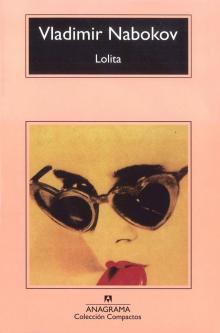 Lolita
Lolita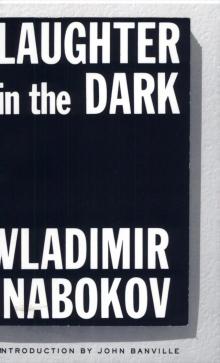 Laughter in the Dark
Laughter in the Dark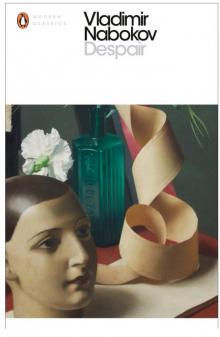 Despair
Despair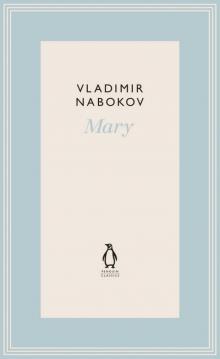 Mary
Mary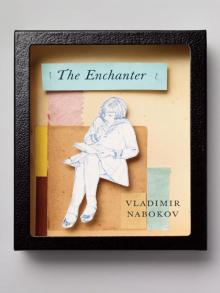 The Enchanter
The Enchanter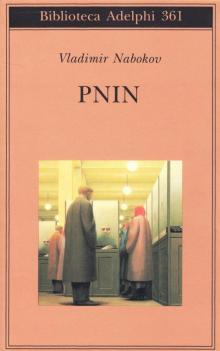 Pnin
Pnin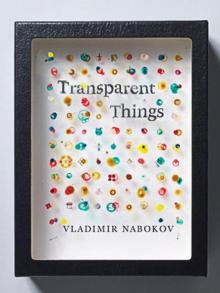 Transparent Things
Transparent Things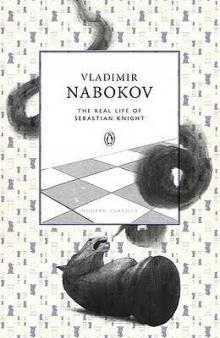 The Real Life of Sebastian Knight
The Real Life of Sebastian Knight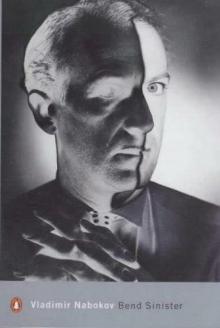 Bend Sinister
Bend Sinister Invitation to a Beheading
Invitation to a Beheading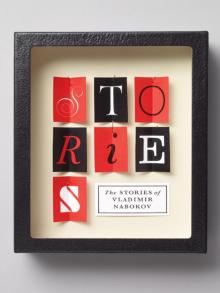 The Stories of Vladimir Nabokov
The Stories of Vladimir Nabokov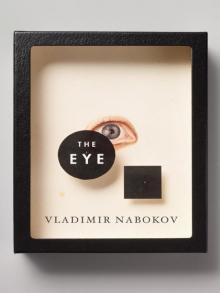 The Eye
The Eye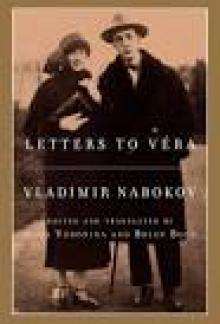 Letters to Véra
Letters to Véra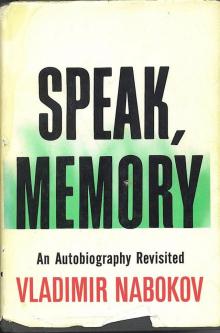 Speak, Memory
Speak, Memory The Gift
The Gift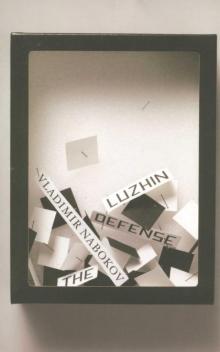 The Luzhin Defense
The Luzhin Defense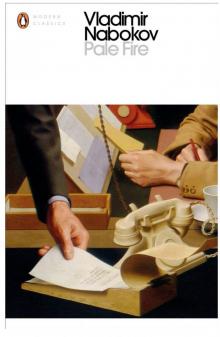 Pale Fire
Pale Fire Glory
Glory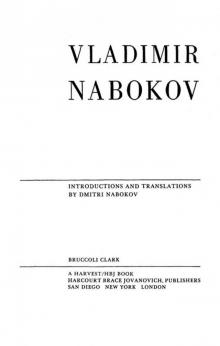 Man From the USSR & Other Plays
Man From the USSR & Other Plays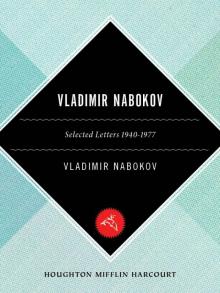 Vladimir Nabokov: Selected Letters 1940-1977
Vladimir Nabokov: Selected Letters 1940-1977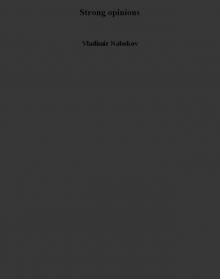 Strong opinions
Strong opinions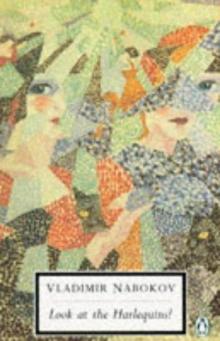 Look at the Harlequins!
Look at the Harlequins!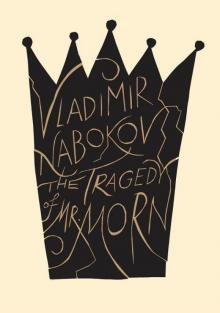 The Tragedy of Mister Morn
The Tragedy of Mister Morn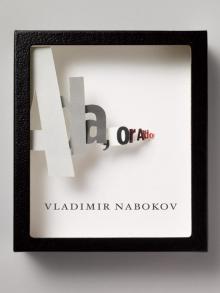 Ada, or Ardor
Ada, or Ardor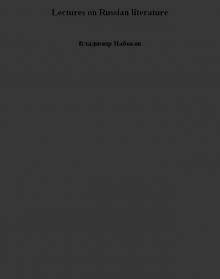 Lectures on Russian literature
Lectures on Russian literature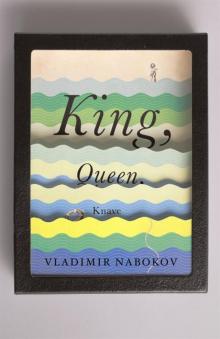 King, Queen, Knave
King, Queen, Knave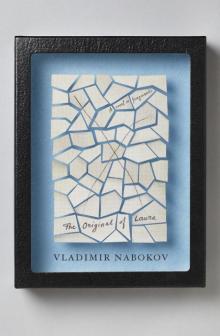 The Original of Laura
The Original of Laura